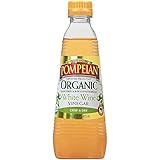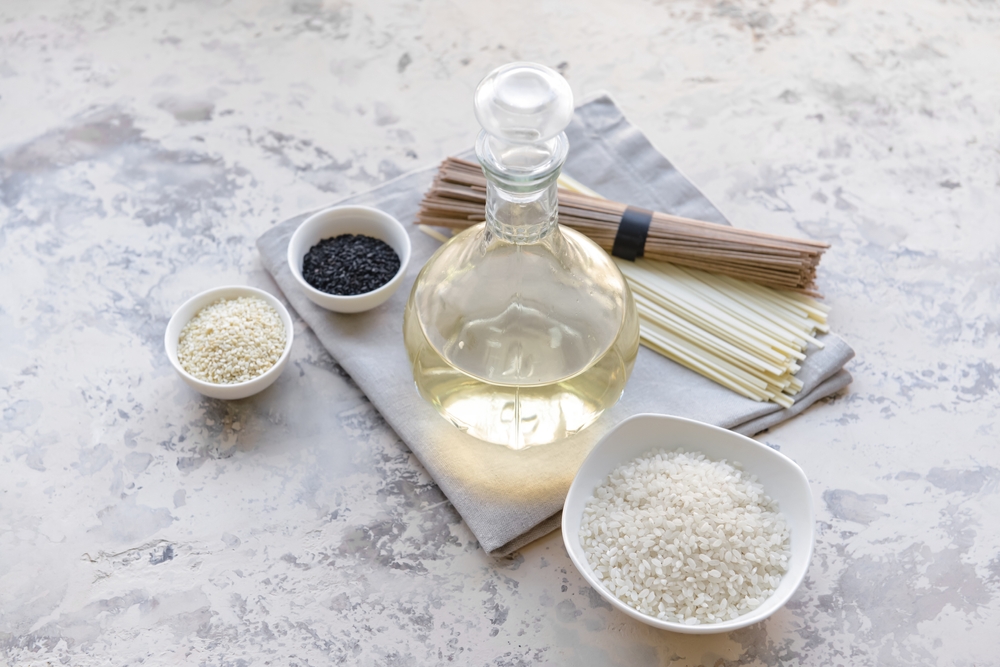There is always that one recipe that calls for rice vinegar. So, you go out to the store and buy a bottle of it to only use a tablespoon or two. Now you are stuck with a bottle of rice vinegar that is well past the date on the label. For this reason, a frequently asked question that many people have about it is: Does rice vinegar go bad?
It’s highly unlikely for rice vinegar to go bad. It can last over 5 years in the pantry and over 10 years in the refrigerator. However, since rice vinegar is not as acidic as other vinegars, it does not retain its flavor as well as other vinegars. After about five years of storage, you might notice a change in flavor.
In this article, we will discuss whether rice vinegar goes bad over time, as well as how to properly store rice vinegar. We will also highlight a few alternatives to rice vinegar. Let’s dig in!
Contents
Does Rice Vinegar Go Bad Over Time?
Since rice vinegar is not as acidic as other vinegars, it does not retain its flavor as well as other vinegars. That does not necessarily mean that it goes bad, though. That simply means after about five years of storage, you may start to notice a change in flavor. So, if you expect to keep it longer than 5 years, it is best to store it in the refrigerator, as that will retain its quality for a longer period of time.
If you plan to use the entire contents of the bottle in a short period of time, the storage method will not make a big difference. That is not usually the case, though. Most people only need a small amount for a recipe and then store the rest of it in the pantry or refrigerator. Therefore, if you are not sure when you will use your rice vinegar next, it is best to keep it in the refrigerator to maintain its quality. If an abnormal flavor or odor develops, it should not be consumed and discarded immediately.
How Can You Tell If Rice Vinegar Has Gone Bad?
The best way to tell if rice vinegar has gone bad is to smell or taste it. Rice vinegar comes in a range of colors and each one tastes slightly different. That is why it is important for you to take note of the taste and color when you buy it. Like other varieties of vinegar, it is highly unlikely for it to go bad. However, if you notice a change in color or flavor, it should not be consumed and discarded immediately.
One other thing you should be aware of is something called mother of vinegar. If you notice a cloudy or slimy sediment at the bottom of the bottle, that is the mother. It forms over time after opening the bottle, even if your rice vinegar was filtered. This is nothing to be concerned about; it is harmless and can be filtered out using coffee filters. Although you might find it a little gross, vinegar with mother is perfectly fine to use.
Last but not least, many producers put a “best by” date on the bottle. That is not to be confused with a “use by” date. It is not necessarily an expiration date. That date is simply an estimate of how long the product will retain its freshness.
How To Properly Store Rice Vinegar?
Storing rice vinegar is similar to storing other types of vinegar such as balsamic or red wine. The bottle of rice vinegar should be kept in a cool and dark place away from sunlight or other sources of heat. The pantry is the best option, but a cupboard in the kitchen would be fine, too. When stored in the pantry or cupboard, rice vinegar will last 5 or more years. You can also keep it in the fridge to double its shelf life.
How To Store Rice Vinegar
- Find a cool, dark place such as a pantry or cupboard away from sunlight or other sources of heat.
- Make sure there is a constant temperature, away from the stove or dishwasher, and do not keep move it back and fourth from the pantry to the refrigerator. Pick one spot, ideally the pantry or cupboard, and keep it there.
- Keep it in its original bottle, as this will prevent any cross-contamination from other containers.
- Make sure it is tightly sealed and the bottle is not damaged before storing it away for next time.
Does Rice Vinegar Go Bad After Opening?
It is highly unlikely for rice vinegar to go bad in a way that is unsafe to eat, even after opening. Rice vinegar can last five or more years in the pantry or cupboard, and ten or more years in the refrigerator. Rice vinegar is less acidic than other vinegars and therefore does not retain its flavor as well as other vinegars. However, that does not mean it goes bad. Producers recommend consuming your rice vinegar by the “best by” date on the bottle in order to experience the full flavor and quality of the vinegar, but it will most likely keep for up to ten years past that date.
Once again, proper storage is key for maintaining freshness of rice vinegar.
Can You Get Sick From Old Rice Vinegar?
Rice vinegar that has been stored improperly for a while can produce peroxides, which are toxic compounds. Rice vinegar that has gone bad is no longer safe to eat and can cause sickness if consumed. If you consumed rice vinegar that has gone bad, you can expect to experience symptoms of food poisoning. These symptoms include upset stomach, stomach cramps, nausea, vomiting, fever, and diarrhea. These symptoms will usually resolve on their own within 24-48 hours. However, if you are concerned or feel your symptoms are getting worse, seek medical attention immediately.
Alternatives To Rice Vinegar
Rice vinegar is less acidic than other vinegars and adds a mellow, sweet flavor to many recipes including marinades and salad dressings. Although nothing can replace the unique flavor of rice vinegar, there are some alternatives that you can try instead that may provide a similar flavor profile.
 Pompeian Organic White Wine Vinegar
Pompeian Organic White Wine Vinegar
This organic white wine vinegar has been expertly crafted by The Olive Oil People. Its crisp, dry taste is perfect for a variety of dishes such as salad dressings, shellfish and sauces. It comes in a BPA-free bottle to protect and preserve the quality and taste of your vinegar. This brand is also naturally gluten-free and verified by the non-GMO project.
 BRAGG Organic Raw Apple Cider Vinegar
BRAGG Organic Raw Apple Cider Vinegar
This brand of apple cider vinegar is unfiltered, unheated, unpasteurized and contains the amazing Mother of Vinegar. It is a wholesome way to add delicious, light flavor to most foods. Use it in salad dressings, add it to smoothies, or even take a shot of it to promote fat burning and weight loss.
 Sicilia Lemon Juice
Sicilia Lemon Juice
This brand of lemon juice is squeezed from fresh lemons, not from concentrate and imported from Italy. You can use it the same way you would use a fresh lemon – keep fresh cut fruits and vegetables fresh for a longer period of time, use it in marinades or salad dressings, and so much more.
Napa Valley Naturals Champagne Vinegar
![]() This brand of champagne vinegar is made from the best olives, grapes, seeds or nuts from the finest orchards and farms around the world. It is perfect for marinades and sauces like hollandaise sauce and homemade mayonnaise.
This brand of champagne vinegar is made from the best olives, grapes, seeds or nuts from the finest orchards and farms around the world. It is perfect for marinades and sauces like hollandaise sauce and homemade mayonnaise.
It also makes a great pickling liquid. If you want to use it for a salad dressing, however, it comes out best when combined with a few other simple ingredients such as olive oil, lemon, garlic and spices.
 Napa Valley Naturals Sherry Vinegar
Napa Valley Naturals Sherry Vinegar
This all-natural product features a flavor of toasted nuts and chocolate with an unmistakable sweet and robust taste. Add a few drops to a finished dish or use it half-and-half with another vinegar or lemon juice to make a tasty vinaigrette. No matter how you enjoy it, you are sure to love it.
Related Questions
What Are The Ingredients And Nutrition Facts in Rice Vinegar?
Rice vinegar is made by fermenting the starches in rice using an acetic acid bacteria known as Mother of Vinegar and small amounts of rice wine to convert the sugars into alcohol and then into acetic acid. The nutrition facts in rice vinegar per one tablespoon serving are: 0 calories, less than 1g protein, less than 1g fat, less than 1g carbs, and less than 1g sugar.
Is Rice Vinegar Healthy?
Rice vinegar has a number of health benefits. For example, rice vinegar can help control blood sugar, lower cholesterol levels, and aid in weight loss efforts. However, there are also some potential risks associated with rice vinegar. Those risks include tooth damage, low potassium levels and osteoporosis.
Does Rice Vinegar Have Sulfites?
Rice vinegar may contain naturally occurring sulfites depending on the soil the rice is grown in.
